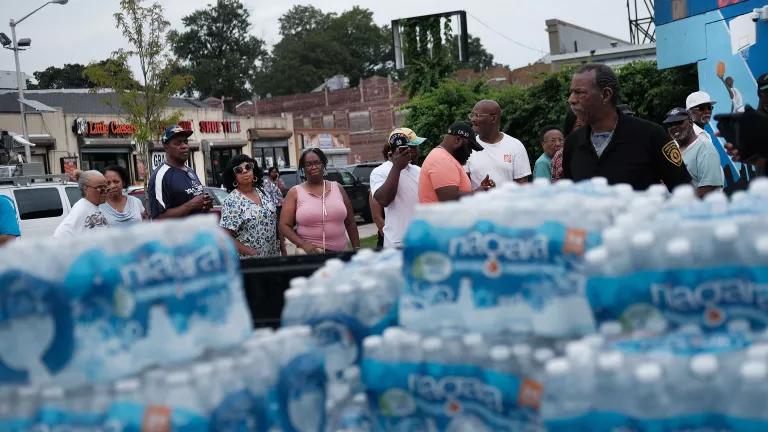Lead Contamination: Imagine a Day Without Water
Lead contaminated water has wrought devastating effects in communities across the US for far too long, running along the same familiar grooves of inequality and deepening the environmental and health burdens for people of color, who often are overrepresented in communities with the most lead service lines.

On a day usually marked by solemn consideration of urgent water issues and calls to action, there is one big reason to be hopeful—we are getting closer to winning a longstanding critical water battle. For the 7th annual Imagine a Day Without Water, we are highlighting NRDC and our partners’ longstanding fight for equitable access to clean, lead-free drinking water and the hurdles we still have to clear before this issue and all lead service lines are officially uprooted.
Lead contaminated water has wrought devastating effects in communities across the US for far too long, running along the same familiar grooves of inequality and deepening the environmental and health burdens for people of color, who often are overrepresented in communities with the most lead service lines. Black children in particular are disproportionately exposed to lead. NRDC has been working to eliminate lead contamination since its founding, and we know that fixing this problem is doable. It can and must be done now.
Getting lead out of drinking water is one of the cornerstone issues we are trying to address at NRDC. As we’ve seen in Flint, Newark, and now in Benton Harbor, MI, these majority Black communities and others across the country often are hit hardest by environmental injustices such as lead in their drinking water.

The water tower at the Flint Water Plant in Flint, Michigan on January 23, 2016
The country watched Flint, MI come to grips with this same reality on an unendurable scope as its story of lead-contaminated water dominated the news for years. In 2016, after two years of dedicated advocacy from Flint residents, which was dismissed by government officials, the community partners and NRDC sued city and state officials to help address the lead contamination crisis and secure safe drinking water for the Flint community. We eventually successfully settled the case, forcing actions to address the lead problem, including by requiring removal of lead water pipes in the city. This was an important step towards justice for the community.
Even at very low levels, lead can cause serious, irreversible damage to the developing brains and nervous systems of babies and young children, decrease a child’s cognitive capacity, cause behavior problems, and limit their ability to concentrate. There is no safe level of lead.
Now, another majority Black Michigan community is experiencing the worst type of deja vu. For the past three years, Benton Harbor has been facing lead levels in its drinking water that in some homes reached nearly 60 times as high as the federal action level with no effective action to remedy the problem. NRDC joined a group of 20 Michigan and national organizations to file an emergency petition with the U.S. Environmental Protection Agency (EPA) to secure a free source of safe drinking water for Benton Harbor’s nearly 10,000 residents, but those affected by this lead contamination have already faced irreversible harm.
Flint and Benton Harbor are far from standing alone with these issues. NRDC estimates that there are from 9 to 12 million lead pipes in all 50 states that connect water mains to homes. Lead service lines are the equivalent of drinking from a lead straw. As long as the pipes are in the ground they are a ticking time bomb threatening public health. Every day, we are faced with other environmental and health issues with solutions that require massive structural change, international collaboration, and innovation to solve, but when it comes to protecting people from lead in their drinking water, replacing lead pipes will go a long way in preventing another crisis like Flint or Benton Harbor.

Examples (from left to right) of a lead pipe, a corroded steel pipe and a lead pipe treated with protective orthophosphate
U.S. EPA Region 5
To his credit, President Biden has called for the removal of all lead service lines across the country. President Biden’s American Jobs Plan calls for an investment of $45 billion to replace lead pipes servicing while also providing good-paying jobs in communities across the country. This is an unparalleled opportunity to tackle lead contaminated drinking water and address our broader water infrastructure problems.
Safe water is a human right that should not be determined by your zip code. NRDC has been dedicated in our efforts to ensure that a day without water is no longer a vivid reality in communities across the country due to contamination from lead pipes. Hopefully by next year’s “Imagine a Day Without Water,” lead pipes will be one less thing to consider.




